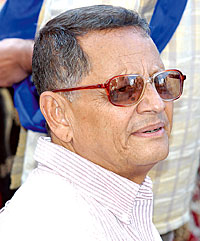 A former bureaucrat in the Panchayat era and finance minister in the interim cabinet that ushered in Nepal's "democratic spring", Devendra Raj Panday is now coordinator of the Citizen's Movement for Democracy and Peace fighting against the king's rule. He told Nepali Times that support for the CMDP has been stronger than expected.
A former bureaucrat in the Panchayat era and finance minister in the interim cabinet that ushered in Nepal's "democratic spring", Devendra Raj Panday is now coordinator of the Citizen's Movement for Democracy and Peace fighting against the king's rule. He told Nepali Times that support for the CMDP has been stronger than expected. Nepali Times: Although the Citizen's Movement has attracted enthusiastic crowds to its events, we haven't seen tens or hundreds of thousands of people on the streets. Has the movement been successful?
The Citizen's Movement has exceeded our expectations in almost all cases. We started at a point in time when we thought we'd waited too long for the parties to come to the front. The seven-party agitation was there but it hadn't really caught fire. We were waiting and waiting and finally we said 'All right, we'll go to the streets ourselves'.
Do you think there is any hope for reconciliation with the king?
The minimum demand that I think we'll end up making is the holding of a constituent assembly, which will hopefully lead us to a republic. In this day and age how can we have a regime when a head of a government cannot be put to public scrutiny in any way? This one point alone should illustrate why people who think logically are moving away from the monarchy.
Have you considered that the majority of Nepalis might be willing to give up multiparty democracy temporarily for peace and stability?
I'm not saying that the majority of Nepali people will come out on the street tomorrow in support of democracy. What I am saying is that the more politically aware among them must already be seeing things for what they are. Dictators have a way of winning the hearts of the common people. They do so through certain social-economic programs or by showing some degree of technical efficiency in government .because they can do away with all the wrangling and fighting of the political parties. This regime has done nothing of that sort. So I do not see any reason why any person would say 'all right, why don't we give this king a chance'.
The way you describe it, it sounds like confrontation is inevitable?
How long can any country go on like this, in circles? You know we started this thing in 1951 when we had the first revolution, as we call it.Even going back to 1990 is not acceptable to people like me. I was responsible, legally, for this constitution because I was in the interim cabinet.Right from that time there have been demands about issues that the constitution originally did not address. These have to do with the rights of minorities, of linguistic groups, about the Hindu state and the total lack of any provision for local autonomy. These will not be addressed by a king who wants to centralise all the power in the royal palace.
The king appears to be setting his own agenda despite pressure from within and outside Nepal. Has the international community done enough to help restore multiparty democracy?
My dread is that the international community may back off, saying 'we can't go on like this, let's have some sort of understanding with the king'. My plea to the international community has always been-you don't need to go forward (but) please don't go backward.Going forward is our responsibility. We can't expect the US, the UK and India to return democracy for us, we need to do that ourselves.
What do you think is going to happen in coming months?
Our hope is that now that the citizen's movement has established itself, in a loose way.If the political parties were to make up their minds about the goals they want to reach and about their position vis-?-vis the king in such a way that the citizens would be inspired to join them, then they and the citizens movement would join together and become a national movement. At that time we should be able to see the kind of crowd you would expect, that could topple the king...But if the king were to become a constitutional monarch in the real sense-for example pay his taxes-that would be the kind of ruler that I think that not many people would object to.


